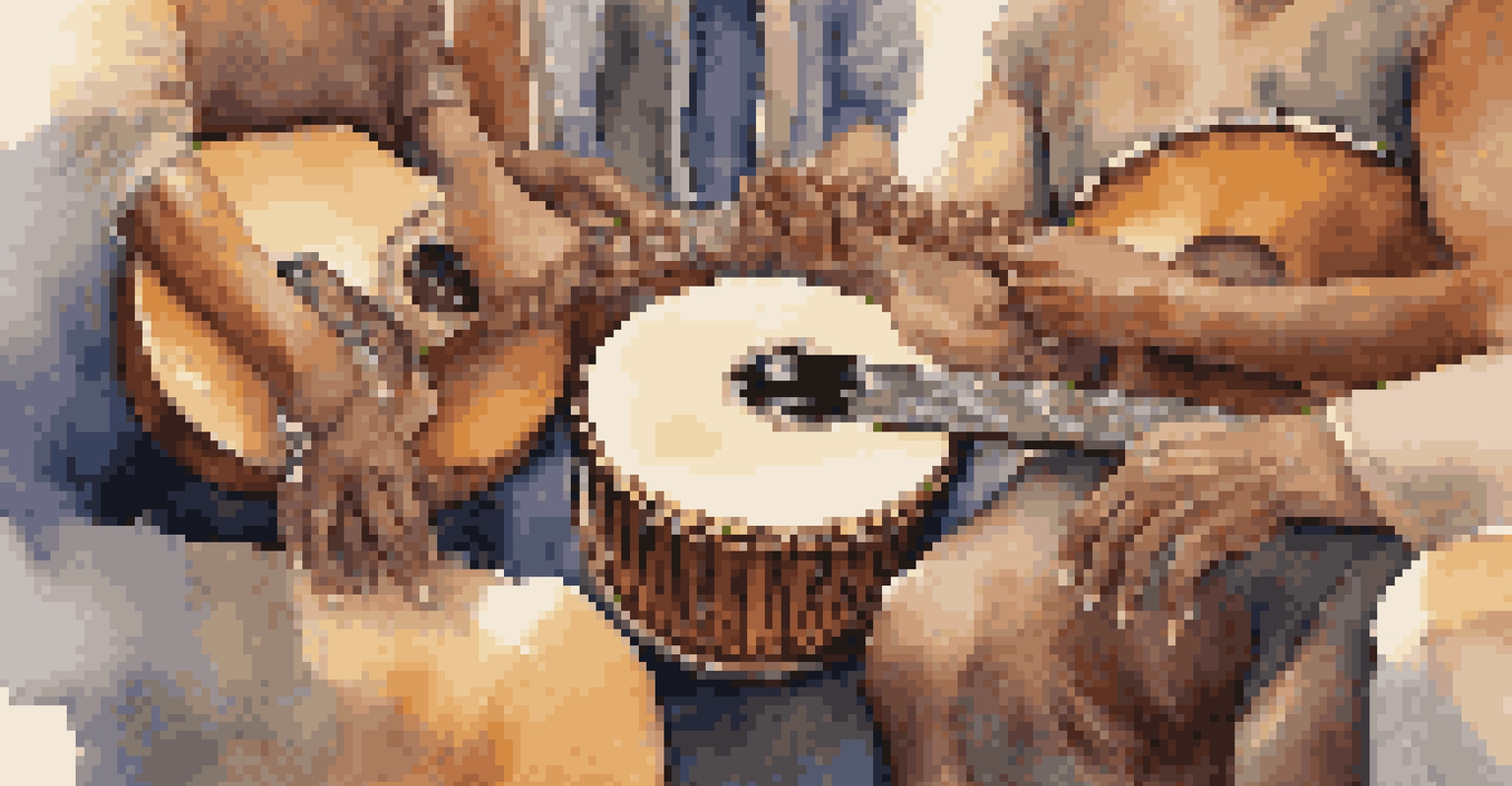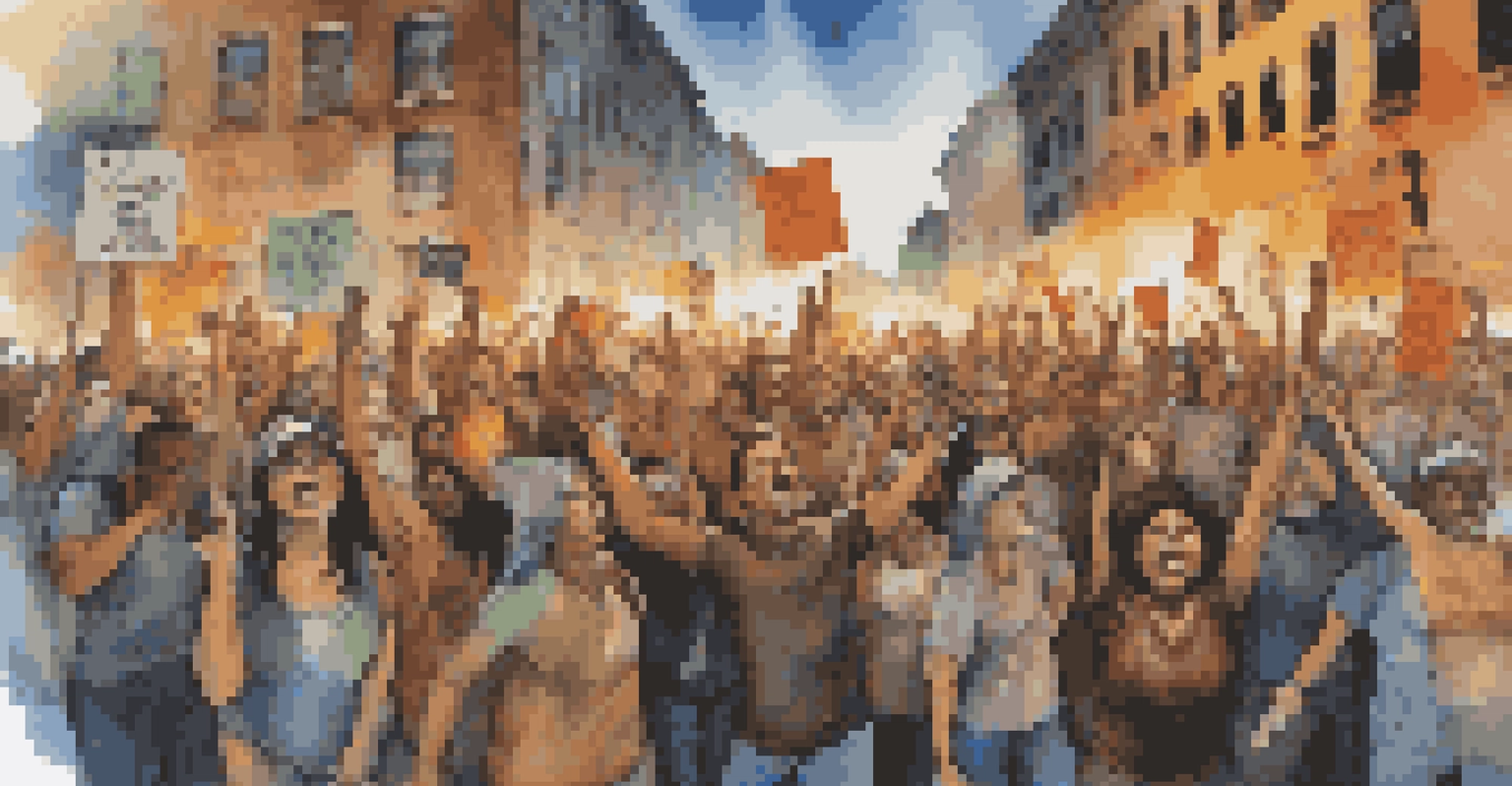The Role of Music in Shaping Collective Identity and Movements

Understanding Collective Identity Through Music
Collective identity refers to the shared sense of belonging among a group of people. Music plays a pivotal role in forming these identities, often acting as a unifying force. For instance, national anthems evoke feelings of pride and togetherness among citizens, highlighting music's power to create a shared experience.
Music can change the world because it can change people.
Consider how different genres of music resonate with various communities, from hip-hop representing urban struggles to folk music echoing rural traditions. Each genre helps to articulate the values, history, and aspirations of its audience. This shared musical language fosters a sense of belonging and mutual understanding.
As individuals engage with music that reflects their experiences, they often find a voice for their frustrations and hopes. This connection reinforces their collective identity, demonstrating how music not only reflects but also shapes the fabric of society.
Music as a Catalyst for Social Movements
Throughout history, music has been a powerful catalyst for social movements. Songs often serve as anthems, rallying people together and inspiring action. For example, 'We Shall Overcome' became synonymous with the Civil Rights Movement, encapsulating the struggle for equality and justice.

These musical pieces not only unify participants but also communicate messages of resistance and hope. They can stir emotions, energize protests, and even attract media attention, amplifying the movement's message. In this way, music effectively transforms individual feelings into a collective call for change.
Music Shapes Collective Identity
Music acts as a unifying force, fostering a shared sense of belonging and reflecting the values and aspirations of communities.
Moreover, contemporary movements like Black Lives Matter and climate activism continue to harness music's power. Artists create new songs that resonate with current social issues, reinforcing solidarity and inspiring future generations to take action.
The Emotional Connection of Music in Movements
Music has a unique ability to evoke deep emotions, making it an essential tool in movements. The emotional resonance of a song can empower individuals, instilling a sense of purpose and urgency. When people sing together, it creates a shared emotional experience that strengthens their commitment to the cause.
The power of music can never be underestimated. It can bring people together, heal wounds, and inspire change.
Take, for example, the use of protest songs during the Vietnam War. These songs captured the sentiments of a generation, reflecting their disillusionment and desire for peace. The emotional weight of the music made these sentiments more palpable, helping to galvanize public opinion against the war.
This emotional connection is crucial, as it transforms abstract ideas of justice and change into relatable experiences. Music thus becomes a vehicle for empathy, allowing individuals to connect on a human level, regardless of their backgrounds.
Cultural Identity and Music's Influence
Music is a key marker of cultural identity, often reflecting the traditions and values of a community. It helps individuals connect with their heritage, fostering a sense of pride and belonging. For example, traditional folk music often tells stories of a culture's history and struggles, preserving these narratives for future generations.
As globalization increases, music serves as a bridge between cultures, allowing for the exchange of ideas and identities. This blend can give rise to new genres that reflect diverse influences, showcasing the evolving nature of cultural identity. Think of how reggae has influenced pop music, creating a rich tapestry of sounds that celebrate multiculturalism.
Power of Music in Social Movements
Throughout history, music has been a catalyst for social change, inspiring action and unifying individuals under a common cause.
Through music, individuals can reclaim and celebrate their cultural identities, especially in marginalized communities. This reclamation often plays a vital role in social movements, as it reinforces the importance of cultural heritage in the fight for rights and recognition.
The Role of Music in Political Activism
Music has long been intertwined with political activism, serving as a means of protest and expression. Songs often articulate dissent and challenge the status quo, empowering individuals to raise their voices. Artists like Bob Dylan and Joan Baez used their music to inspire activism during the 1960s, addressing issues like civil rights and anti-war sentiments.
In modern times, musicians continue to use their platforms to advocate for change. For instance, artists like Beyoncé and Kendrick Lamar address social issues in their lyrics, sparking conversations and encouraging listeners to engage with political matters. This demonstrates how music transcends entertainment, becoming a tool for social awareness.
Moreover, music festivals and concerts often double as platforms for activism, promoting causes and encouraging attendees to take action. By blending entertainment with advocacy, musicians can reach broader audiences, making their messages even more impactful.
Music and Community Building
Music fosters community building by bringing people together, creating shared experiences that strengthen social bonds. From local concerts to global music festivals, these gatherings provide spaces for individuals to connect over a common love for music. This sense of community can be particularly powerful in marginalized groups seeking solidarity and support.
In many cultures, communal music-making is an essential practice, whether it's through traditional ceremonies or modern gatherings. These collective experiences create feelings of belonging and support, reinforcing the group's identity. For example, drumming circles often encourage participation and unity among diverse groups.
Cultural Identity Through Music
Music serves as a vital marker of cultural identity, bridging communities and allowing individuals to reclaim and celebrate their heritage.
Additionally, music can help to bridge generational gaps, as older and younger individuals come together to share their musical tastes. This intergenerational exchange not only strengthens community ties but also fosters a deeper understanding of diverse perspectives within the group.
The Future of Music in Collective Movements
As we move forward, the role of music in shaping collective identity and movements will likely evolve. With the rise of digital platforms, musicians can reach wider audiences and engage with social issues more directly than ever. This accessibility can lead to the emergence of new anthems that resonate with contemporary struggles.
Moreover, the increasing intersection of technology and music allows for innovative ways to mobilize communities. Social media campaigns often utilize music to amplify messages and connect individuals across the globe. This fusion of music and technology enhances the potential for collective action and solidarity.

Ultimately, music will continue to be a vital part of social movements, reflecting our shared experiences and aspirations. As we face new challenges, the power of music to unite and inspire will remain an indispensable force for change.